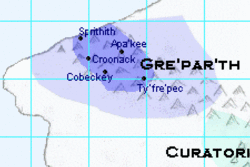Gre'par'th
Gre'Par'th
gree • parr • f
translates as: the spirit hills
Contents
Briefly
Gre'par'th is home to the largely nomadic humans in the mountainous, harsh northwest of Igala. There are very few 'towns,' and each town's inhabitants are always changing. These humans are actually descendants of the wingless dragons which live in the mountains.
Explanation of Countries City and Town
(note: A family is made up of generally 9 people; 3 children, 2 parents, and 4 grandparents. This is the average size)
Though not officially a country, the tribes of barbarians living there are the only true settlers in the harsh climate. Of the many places the barbarians roam to there are few places that could be even called a village. There can be said to be, however, five main areas that have in recent times been built upon.
There is the town of Sprithith. North of the centre town/city and on the mountains near the coast. Sprithith translates into 'Water Guardian Spirit.'
Croonack is the village south of this, laying in-between two mighty mountains. Croonack translates into 'The Pass that Fell.'
Cobeckey is the next village, the smallest of the five areas, due to the fact it rests on Gro'pack 'The Unsteady Mountain' that is said to be hollow. Cobeckey means 'To hunt to die.'
The final village, is Ty'fre'pec, 'The Graveyard of Spirits.' Despite its name, Ty'fre'pec is actually the only village that is not attacked regularly by the dragons that swarm through the mountains.
The City, which had three temples built within it, is simply Apa'kee -- 'The Home.'
These are the only places that have families that don't move around the mountains and the 'plains.'
Each one, apart from Apa'kee, holds barely 10 families at a time (though the land around the villages are sometimes used as well). The City Apa'kee holds over 50 families that don't move, and can hold another 20 families at one time.
Apa'kee is the newest of the area colonated, its history stretches 700 years back. The oldest is Ty'fre'pec, which history is known to stretch over 1,000 years and is said to be over 3,000 years old, is the oldest village.
History
How the tribes came to live in the mountains is only explained in myth. Through the dragons that fought the Gods, that shed there scales and cast aside the Gods' Will gave birth to the humans. No other explanation has been asked for or given.
A first there was no country and there was no colonated areas. Each family looked after itself and had little to do with another person. It is known as a fact that the Wolf-Pigs, a strange creature that roams the mountains, found and helped the humans. They gave the humans order and help, in return, humans gave knowledge and friendship to the Wolf-Pigs. Soon the families had gathered under tribes, like packs of wolves, and wondered around the mountains still.
A some point, The Grave Yard Of Spirits, Ty'fre'pec, was built into the side of a nameless mountain by a man named Che', under the protection of the Wolf-Pig Breff. Then at unknown times all the other villages where built, until 700 years ago Apa'kee was built. It grew in size thanks to its ideal position with in the mountains, providing good hunting grounds and protection from the harsh elements. It ground is also heated by the magma flow underneath it, that is raised dangerously close to the surface.
Apa'kee once housed three of the great Spirit Temples, the monuments to the three Spirits of the world, The Hills, The Water and The Darkness. Two of the three stand now, after a boy named Ark, who is under the protection of S'li leader of the Wolf-Pigs, destroyed The Darkness temple after it had finally been completely finished after 150 years of work.
As far as culture, the people are simple tribesman but hold a few strange customs. No man nor woman is to kiss unless if marriage is intended. If such an act is done and marriage is not wanted, then the two must fight to the death, the winner being free of the promise.
Death is delt with in a curious fashion as well. Death happens a lot in the mountains, with dragon attacks and Mountain Worms digging away the mountains, and so is accepted easily by all. Food is hard to come by in the mountains and a tradition soon sprung up that any dead body, being now meat, must never be wasted. Families hold a goodbye feast, where they all eat the dead family member. If no family is left, then the village is given the body.
The country can be said to be peaceful. No war has ever broken out within it. Such a thing would be pointless. Tribes have been known to attack each other over past differences, leading to maybe a few families died at the most, but on the whole such actions have no place in there daily struggle to survive.
As for the people, they are human in appearance and strengths and weaknesses, though the harsh climate means they seem naturally stronger and fitter. However they are different from humans because of one thing, they give birth to eggs (which have grown within the mother for 3 months) that hatch after a month of laying. The strangeness of this difference is perhaps only explained by there myth of where they come from..."
Miscellany
Money Matters
Barter is used, as Gre'par'th has no central government and mints no money.

